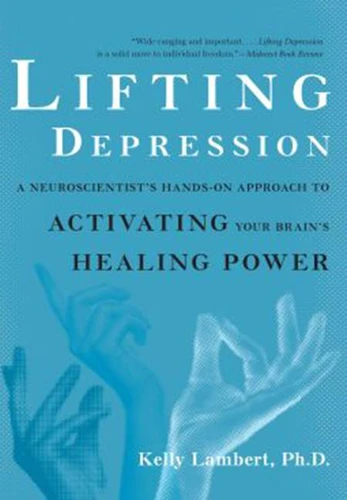Lifting Depression. A Neuroscientist's Hands - On Approach to Activating Your Brain's Healing Power
Par :Formats :
Disponible dans votre compte client Decitre ou Furet du Nord dès validation de votre commande. Le format ePub protégé est :
- Compatible avec une lecture sur My Vivlio (smartphone, tablette, ordinateur)
- Compatible avec une lecture sur liseuses Vivlio
- Pour les liseuses autres que Vivlio, vous devez utiliser le logiciel Adobe Digital Edition. Non compatible avec la lecture sur les liseuses Kindle, Remarkable et Sony
- Non compatible avec un achat hors France métropolitaine
 , qui est-ce ?
, qui est-ce ?Notre partenaire de plateforme de lecture numérique où vous retrouverez l'ensemble de vos ebooks gratuitement
Pour en savoir plus sur nos ebooks, consultez notre aide en ligne ici
- Nombre de pages304
- FormatePub
- ISBN978-0-7867-3216-6
- EAN9780786732166
- Date de parution04/01/2010
- Protection num.Adobe DRM
- Infos supplémentairesepub
- ÉditeurBasic Books
Résumé
Today's young adults are up to ten times more likely to experience depression than their grandparents were. Could it be that in our increasingly automated world, the reduced physical effort needed to accomplish anything may somehow interfere with our level of happiness and subsequent responses to stress? Neuroscientist Kelly Lambert finds compelling evidence that having to work hard for rewards significantly improves mood and prevents depression.
Beginning with her innovative research on rats-she compared "trust-fund rats" (whose rewards came with no effort on their part) to hard-working "trained-to-succeed" rodents-Lambert offers hope of treatment for people without debilitating (and often ineffective) drugs. Drawing on a wealth of information from the fields of anthropology, neuroscience, and evolutionary psychology, Lambert develops a unique theory suggesting that physical effort directed toward tangible outcomes activates particular regions of the brain and builds resilience against the emotional emptiness and negative thinking associated with depression.
Whereas most therapies emphasize the importance of mental activity, Lambert reminds us of the importance of physical activity in establishing control in a fast-paced culture that is focused more on the prospect of immediate gratification than savoring the fruits of our labor.
Beginning with her innovative research on rats-she compared "trust-fund rats" (whose rewards came with no effort on their part) to hard-working "trained-to-succeed" rodents-Lambert offers hope of treatment for people without debilitating (and often ineffective) drugs. Drawing on a wealth of information from the fields of anthropology, neuroscience, and evolutionary psychology, Lambert develops a unique theory suggesting that physical effort directed toward tangible outcomes activates particular regions of the brain and builds resilience against the emotional emptiness and negative thinking associated with depression.
Whereas most therapies emphasize the importance of mental activity, Lambert reminds us of the importance of physical activity in establishing control in a fast-paced culture that is focused more on the prospect of immediate gratification than savoring the fruits of our labor.
Today's young adults are up to ten times more likely to experience depression than their grandparents were. Could it be that in our increasingly automated world, the reduced physical effort needed to accomplish anything may somehow interfere with our level of happiness and subsequent responses to stress? Neuroscientist Kelly Lambert finds compelling evidence that having to work hard for rewards significantly improves mood and prevents depression.
Beginning with her innovative research on rats-she compared "trust-fund rats" (whose rewards came with no effort on their part) to hard-working "trained-to-succeed" rodents-Lambert offers hope of treatment for people without debilitating (and often ineffective) drugs. Drawing on a wealth of information from the fields of anthropology, neuroscience, and evolutionary psychology, Lambert develops a unique theory suggesting that physical effort directed toward tangible outcomes activates particular regions of the brain and builds resilience against the emotional emptiness and negative thinking associated with depression.
Whereas most therapies emphasize the importance of mental activity, Lambert reminds us of the importance of physical activity in establishing control in a fast-paced culture that is focused more on the prospect of immediate gratification than savoring the fruits of our labor.
Beginning with her innovative research on rats-she compared "trust-fund rats" (whose rewards came with no effort on their part) to hard-working "trained-to-succeed" rodents-Lambert offers hope of treatment for people without debilitating (and often ineffective) drugs. Drawing on a wealth of information from the fields of anthropology, neuroscience, and evolutionary psychology, Lambert develops a unique theory suggesting that physical effort directed toward tangible outcomes activates particular regions of the brain and builds resilience against the emotional emptiness and negative thinking associated with depression.
Whereas most therapies emphasize the importance of mental activity, Lambert reminds us of the importance of physical activity in establishing control in a fast-paced culture that is focused more on the prospect of immediate gratification than savoring the fruits of our labor.




